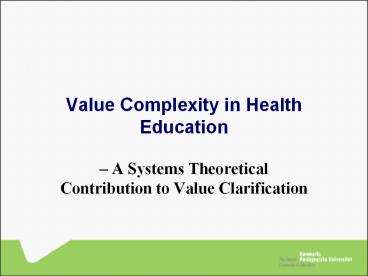Value Complexity in Health Education - PowerPoint PPT Presentation
1 / 21
Title:
Value Complexity in Health Education
Description:
Health education is communication that intends learning about health and promote ... Values tell more about the social context to which they are connected than the ... – PowerPoint PPT presentation
Number of Views:18
Avg rating:3.0/5.0
Title: Value Complexity in Health Education
1
Value Complexity in Health Education
- A Systems Theoretical Contribution to Value
Clarification
2
What values?
- Health is a dynamic state of physical, mental
and social well-being, and not only the absence
of disease and disability (WHO, 1947, 1986) - A healthy life is not only a question of treating
or preventing disease but also a question of the
quality of life and living the good life - A good life is not just being alive, but living
for the realisation of individual and social
values although we may ask, what values?
3
Consequences
- Decisions are no longer based on traditional
norms or on objective knowledge, choice of
rational are contingent and subject to discussion - Health implies individual and social value
complexity - Conflicting values
4
Educational challenges
- Uncover the values of the participants in health
promotion and education - Build competences to expose and reflect on the
value complexity inherent in health promotion and
education
5
General objective
- By observing two health-educational development
projects - To develop/modify a model to describe the
complexity of values in health education - To propose criteria for building competencies for
value clarification in health education
6
Health education
- Health education is communication that intends
learning about health and promote participation
in healthy lives - Learning and teaching are no longer based on the
transfer of knowledge and values individuals are
formed through self-referential processes
7
Ideology
- Health education need a core of value
clarification to provide the action competence
needed for participatory education - The purpose is to reflect on the values
facilitating health promoters, as a contribution
to participatory education
8
Participants and settings
- Values in Health Education and Promotion in
Greenland (1.1.2004-31.12.2006) - 22 health professionals from different
educational practices ?12 local value projects - Values in Public Health Nursing and Primary
Schools in Copenhagen (1.4.2004-31.3.20007) - Phase 1 workshops participating 142 health
visitors - Phase 2 ? 16 PHN ? 12 projects at primary schools
9
Demand for clarifying
- What do the participants say about values?
- How do they relate value to their concept of
health and vice versa? - How do they manipulate communication with the
values? - How do they include the values of their target
group and how do they observe and reflect on
values in their healthy dialogues?
10
Findings (I) Value conflicts
- Promoting healthy learning processes conflicts
with maintaining social control - Having an educational background in biomedical
science conflicts with working with a value
clarified concept of health - Connecting with powerful guidelines of health
behaviour and lifestyle conflicts with
participation in decision making
11
Findings (II) Values
- Health educators do not reflect on their own
health and health promotion as learning processes
through their professional work - Values tell more about the social context to
which they are connected than the educators own
values - Health educators can conceptualize their
comprehension of values of their target groups
but in practice they use lifestyle oriented
methods
12
Findings (III) Contingency
- Participation means contingency
- Educational norms are artificial
- The necessary approach is contingent because
under different conditions the participants may
have to accept different norms - Risk means lack of control
- Social control fix traditional values of problem
solving for others
13
Theoretical model
- Values
- Complexity
- Competencies
14
Values
- Value is an operation with a distinction between
/-, where the positive side of the distinction
is preferred to the negative - Values are generalized, individually symbolized
perspectives which allow one to prefer certain
states or events (Luhmann)
15
Valuing and clarifying
- Values are distinctions made by observers
- Observing the observer makes it possible to
distinguish between - Valuing (as an observation) and value (as a
distinction) - Valuing (first order observations) and clarifying
(second order observations)
16
Social values- communicational constructs
- Interactions e.g. dialogues with citizens
- Organizations e.g. PHN
- Functions e.g.
- Treatment (/- disease)
- Social service (/- help)
- Education (/- learning outcome)
- Care (/- charity)
17
Complexity- important distinctions to
conceptualize
- Valuing (1.order obs.) vs. clarifying (2.order
obs.) - Personal values vs. generalized values
- different functions and role identity
- different social and cultural (semantic) contexts
- Social values vs. mental values (the sense of
individual values) - important in building individual beliefs and in
the interpretation of emotions as well as social
norms
18
Competence
- Competence is second order knowledge, i.e.
knowledge of the conditions of knowing (implying
knowledge of knowledge) - Competence is reflexive or situated knowledge
implying the capacity for self-observation
(Qvortrup)
19
Value clarification as competence
- Reflecting on the diversity of values in order to
build a professional capacity for coping with
value complexity - No professional identity is based on stable
values - No educational practice is based on common values
20
Conclusion
- Value clarification competence is having the
ability to identify values and conflicts of
values relevant to different situations - Health educators are not only capable of
categorizing what they see they also have the
ability to consider their observations together
with their own values
21
Karen Wistoft
- Research Programme for Environmental and Health
Education - Department of Curriculum Studies
- The Danish University of Education
- Tuborgvej 164, DK-2400 Copenhagen NV
- kawi_at_dpu.dk

